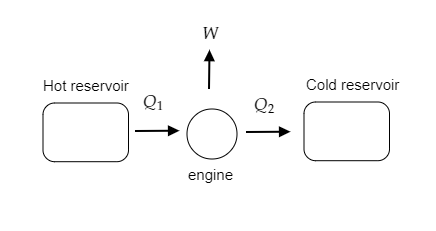Question
Question: An automobile engine absorbs 1600J of heat from a hot reservoir and expels \(1000{\text{J}}\) to a c...
An automobile engine absorbs 1600J of heat from a hot reservoir and expels 1000J to a cold reservoir in each cycle. Find the maximum work done in each cycle.
A) 400J
B) 500J
C) 600J
D) 450J
Solution
According to the first law of thermodynamics, the heat supplied to a system is used to increase the internal energy of the system and to do work. The automobile engine resembles a heat engine that absorbs heat from a source to do some work and rejects the remaining heat to the sink.
Formula used:
The amount of work done by a heat engine is given by, W=Q1−Q2 where Q1 is the heat absorbed from the source and Q2 is the heat rejected to the sink after doing the work W.
Complete step by step answer:

The above figure is a schematic representation of the working of the automobile engine.
In the problem at hand, heat is absorbed from a hot reservoir (or source) by an automobile engine. This absorbed heat is given to be Q1=1600J .
The engine then does some work and rejects the remaining heat to the cold reservoir (or sink).
The heat rejected by the engine is given to be Q2=1000J .
The first law of thermodynamics gives the work done by the automobile engine in one cycle as W=Q1−Q2 ----- (1)
Substituting for Q1=1600J and Q2=1000J in equation (1) we get, W=1600−1000=600J .
Thus the work done by the automobile engine is W=600J. Hence the correct option is C.
Note:
The first law of thermodynamics is actually expressed as ΔQ=ΔW+ΔU where ΔW is the work done by the system and ΔU is the change in internal energy of the system. Here, after each cycle, the automobile engine comes back to its initial state and so the change in internal energy will be zero. Thus for an automobile engine, W=ΔQ . If no heat was rejected to the cold reservoir, then the entire heat absorbed from the hot reservoir would have been converted into useful work by the automobile engine and thus it would have an efficiency of 100%.
